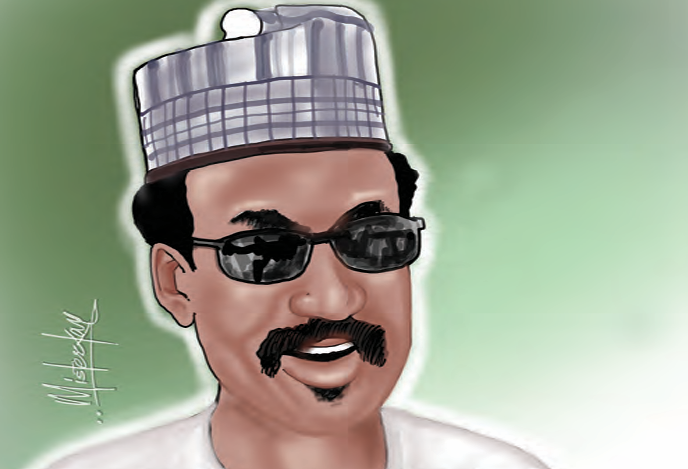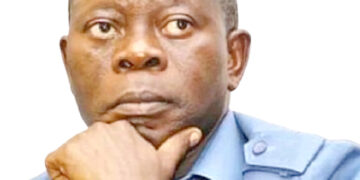I have never made a secret of my admiration for Col. Abubakar Dangiwa Umar (rtd). Right from the time he broke into public consciousness with his brief stint as chief executive officer of the Federal Housing Authority (FHA) to the time he came unto his own as governor of old Kaduna State (including the present Katsina State), he has stood out as an officer and gentleman with an eye on history.
Drop-dead handsome and affable, there were stories about him being one of the three junior officers who played critical roles in the putsch that brought General Ibrahim Badamasi Babangida to power. I often felt that officers like Umar were good marketing tools for the military in attracting brilliant young graduates to join the armed forces because they were the very antithesis of the traditional stereotype of a soldier being a little better than a zombie.
Background
The apple usually doesn’t fall far from the tree. His father, Alhaji Umaru Nassarawa, was a school teacher and administrator with the traditional title of Waziri of Gwandu. He became a member of the Federal House of Representatives between 1954 and 1964, and commissioner for works in the North-Western State from 1968 to 1975.
But having a distinguished pedigree is no guarantee for success in life. The young man put his hands on the grind right from Government College, Sokoto (1964 – 1968), Nigeria Defence Academy (NDA), Kaduna, (1967 – 1972); Nigerian Army Armoured School, Ibadan, (1972); US Army Administration School, Fort Benjamin Harrison, Indiana, USA (1976); Royal Armour School, Kentucky, USA (1977 – 1978); Command and Staff College, Jaji (1978 – 1979 and 1982 – 1983); Bayero University, Kano (1979 – 1981); and Harvard University, USA (1988 – 1989).
He had a distinguished career in the armoured corps of the Nigerian Army and earned the respect of his seniors as a brilliant junior officer before he was entrusted with higher state duties. He came to his own as governor of old Kaduna State where he faced the challenges of religious extremism frontally to the chagrin of many of the gladiators.
It was when Umar was governor of Kaduna that I had a taste of the kind of leader he was. I was the editor-in-chief of MONTHLY LIFE at the time. The Newspaper Proprietors’ Association of Nigeria (NPAN) had scheduled its meeting for Kaduna to discuss the problems facing the industry and intervene in a matter involving one of our colleagues.
New Nigerian
The knotty matter involved Innocent Okparadike, then Editor of New Nigerian newspapers. The grouse was that some editorials, written by faceless and narrow-minded persons, passed over his head, straight to production. Okparadike, it was claimed, still had to sign off on the paper as if he had seen and endorsed every item therein. When the matter was tabled, we all felt that our colleague shouldn’t be disrespected in that manner and that NPAN should take up the issue with Governor Umar later in the day. A committee of veteran publishers was immediately constituted.
If the committee thought that Governor Umar was going to use military fiat to resolve the problem, they were in for a surprise. The governor asked them who were the outsiders ghosting the editorials in question. Then he asked what Okparadike had done about it. When he was told that the editor did not want to ruffle feathers with notable members of the northern establishment, the governor replied that any editor who would sign off on a newspaper whose contents did not pass through his vetting was a coward. He advised that our colleague should refuse to sign off on the paper so that the ensuing crisis could teach all concerned a lesson. “Tell your colleague to be a man and challenge those intruders. It is only then that he can earn their respect”, he reportedly said.
I do not now recall how the matter eventually played out, but I remember that our colleague felt relieved that the governor was not part of the plot and that indeed the amiable colonel was ready to support him if he stood up for himself first.
Role Model
What eventually transported Umar to the pantheon of authentic role models, instructively, wasn’t his soldiering heroics or administrative ingenuity but his loyalty to principles and devil-may-care courage in confronting his bosses at a time when such a posture could have led to a kangaroo court marshal and, possibly, summary execution.
He was the last soldier standing when General Babangida annulled the freest and fairest election ever held in Nigeria. For the first time, a southern candidate beat his northern counterpart in the North and repeated the feat nationwide. The election that would have ushered in a truly national government not based on parochial provincialism was cruelly annulled following which General Babangida retired to his hilltop castle in Minna, Niger State.
Having failed to persuade his bosses to release the remaining results of the election and hand over power to the winner, Umar submitted his letter of resignation. It is unusual to do so in these climes. In a rare interview with TELL magazine, he made some startling revelations regarding his valiant attempts to save his bosses from their greed:
“I went and saw IBB in Abuja again from Bauchi. I told him there are stories (about pressures on him to stop the election results), He said, “I don’t know what is going on.” I said like what? He said, so much pressure is coming from some of your colleagues that they think there is a rumbling within the military. I said it is not true. I said the military is 85 percent and above for the installation of the winner of this election. And already, about 14 states (results) had been released and Abiola had won even in Kano. So, I said, ‘Sir, write your name in gold. If you hand power over to the winner, you will be hailed as the Ataturk (Turkish statesman) of Nigeria’. I said, ‘don’t do anything that will endanger the unity of this country…’”
Kangaroo Plot
Of course, in speaking truth to power, he stepped on many sensitive toes and stratagems were designed to eliminate him:
“Truly, they wrote a memo which Gwarzo took to Abacha that I was visiting places – Minna and Kontagora – and plotting a coup against Abacha’s government. That (memo) is real. And plans were done to eliminate me. Why I was not eliminated, God knows. But I know it’s the prayer of all those good persons that believe in the just cause I have been fighting. It is the invisible hand of God that protected me. It is the same God that protects people that stand by the truth. “
In the midst of all the sacrifice and personal risk, there were people who still thought that Umar’s steadfastness was too good to be true and that he had other hidden motives. He reminisces:
“Sadly enough, people keep wondering how, for goodness sake, can a Fulani man from the Sokoto royal family really fight for the interest of a Yoruba man (over the June 12 issue). There are people that are skeptical because of my geographical extraction, because of who I am, my personality. They cannot believe that I could support the cause of June 12 if that means swearing in a Yoruba man. What they don’t understand, the point they miss, is that one is not fighting purely for a Yoruba man. One is fighting for justice. One is fighting for truth and truth really has a universal language.”
At 75, Col. Abubakar Umar Dangiwa is the kind of personality we should show up as a role model to our children. Here is a man who has lived for something – a man who put his career and his life on the line in defence of truth and justice. I had expected to see his name among national award honourees in the last couple of decades. I wager that President Tinubu wouldn’t need any lobbying to confer the appropriate national award on this authentic hero who turned 75 last month. Ad multos annos, colonel!





